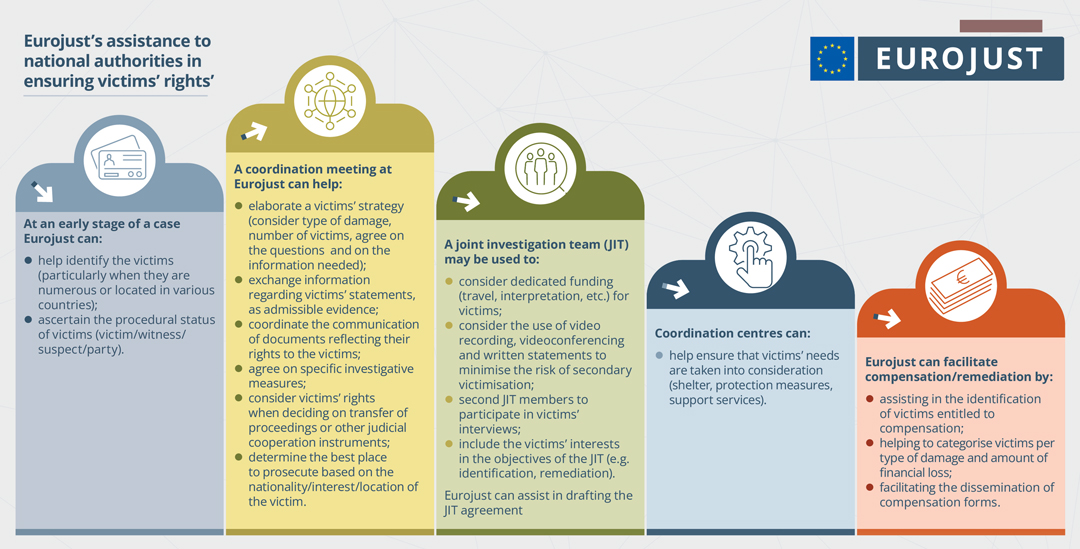In 2023, Eurojust helped deliver justice to more than 375 000 victims of all forms of serious, cross-border crime.
The Agency continued to anchor the victims’ rights dimension in all its operational casework. Through its dedicated Working Group consisting of representatives from all Eurojust crime-based Working Groups, the Agency contributes to ensuring an adequate level of victims’ rights protection in cross-border criminal proceedings. The Working Group is responsible for compiling, monitoring and analysing victim-related issues reported by practitioners working on Eurojust cases.
Eurojust aims to minimise the risks associated with the cross-border dimension of cases by ensuring timely and effective coordination between the various countries and actors involved to preserve victims’ rights. The Agency is uniquely positioned to facilitate information exchange on victims to identify, rescue and protect them. Moreover, it is able to help prevent and resolve conflicts of jurisdiction and find concrete solutions for victims across the European Union, such as the right to compensation.
Eurojust promotes the victims’ rights dimension in all of its casework, regardless of the crime. However, each crime area has its own specificities when it comes to effectively addressing victims’ rights. In human trafficking cases, for example, the early identification of victims is key to ensure that they benefit from the support of specialised services at the soonest possible opportunity. Coordination meetings at Eurojust enable practitioners to discuss the most appropriate ways to identify victims, ascertain their status and ensure that psychological and other forms of support, assistance and protection are available. In a case involving Romanian victims of trafficking for sexual exploitation, the agenda of the first coordination meeting featured an item specifically dedicated to considering victims’ rights. Such best practices are a testimony to Eurojust’s promotion of the victims’ rights dimension at an early stage of the case. This ensures that judicial authorities dedicate time and resources in determining, for example, the location, legal status and potential needs of the victims.
In this particular case, which involved the national authorities of a number of Member States, including Romania, Belgium and the Netherlands, participants exchanged views on the legal status of the victims. The investigations revealed that the victims had been deliberately moved from one Member State to others. The coordination meeting revealed that most of the legislation of the concerned Member States oblige practitioners to prove that the victims were forced to engage in prostitution, while others do not or have a lower threshold. As a result, the same individual can be recognised as a victim in one jurisdiction and not in another. Discussing the matter at Eurojust was pivotal in this case to determine the facts that must be established to prove the constitutive elements of the offences in each country concerned. It was also important to determine the evidence required to satisfy the national legislations. These discussions enabled the national authorities to have a clear understanding of the legislative and operational approaches in each of the Member States where the exploitation of victims took place, and in the case of the Romanian authorities, to reconfigure and adapt their investigation strategy.
Eurojust’s assistance to national authorities in ensuring victims’ rights

